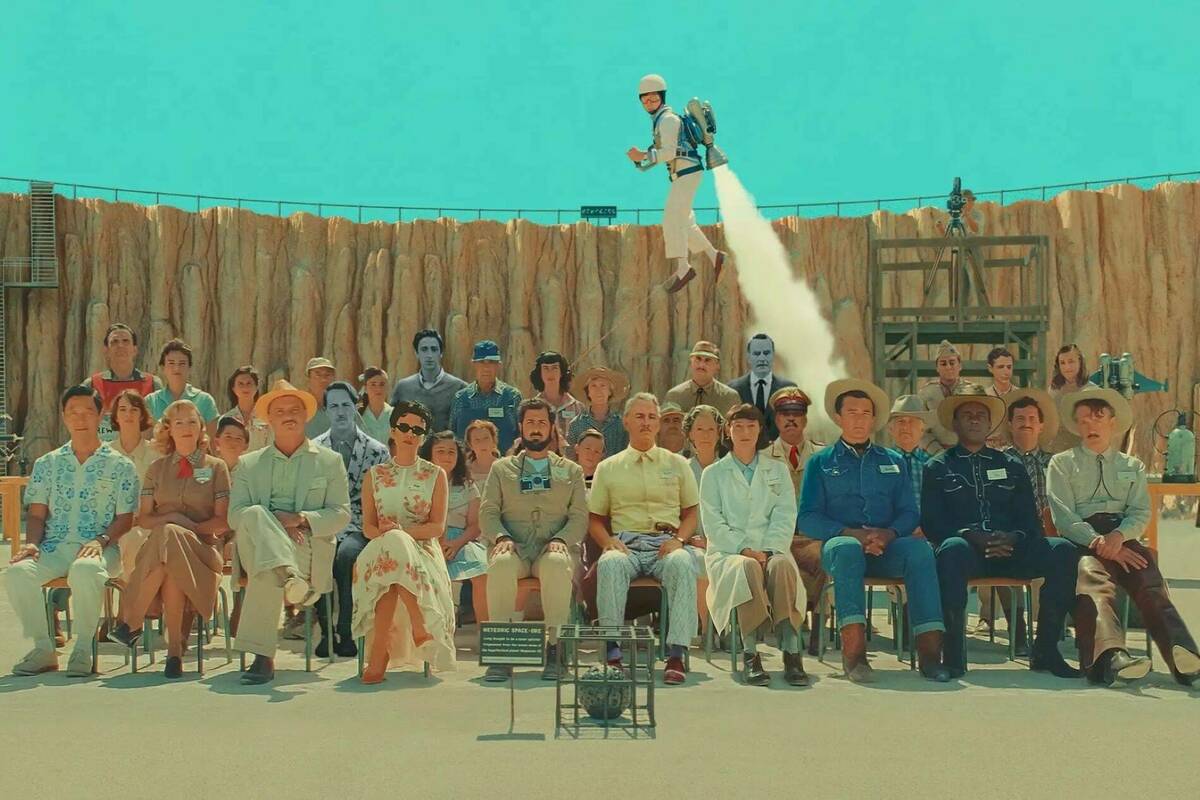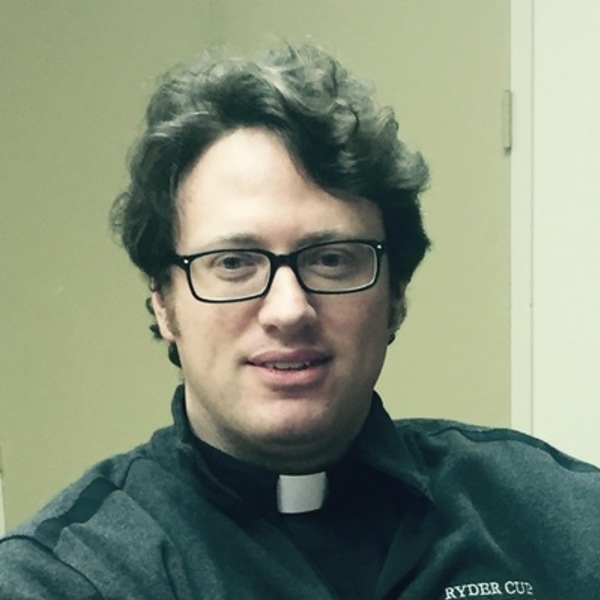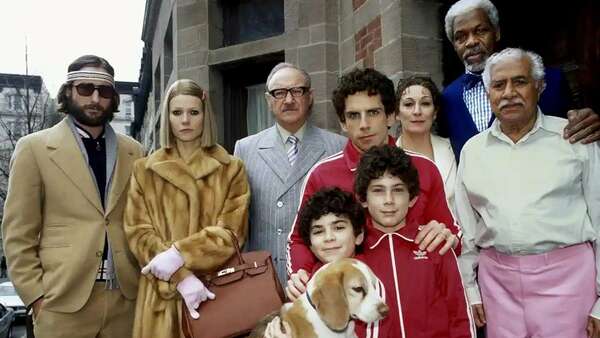Let’s say she’s in heaven, which doesn’t exist for me, of course, but you’re Episcopalian.
—Augie Steenbeck, Asteroid City
SPOILER ALERT: SPOILERS AHEAD!
Elsewhere I accused Wes Anderson of being a liturgist. The mis-en-scènes of his films, each readily recognizable, are, I argued, a sort of rite; cinema itself, I claimed more broadly, is a sort of liturgy. I was trying to say something deeper than what is normally said when religious people talk about films. Cinema is more than simply screened parables, low-hanging fruit for lazy preachers, more also than the expressions of the Catholicism, well-formed or ill, of the auteur. Rather, cinema, I argued, shapes religion.
Thinking variously in terms of one, Bazin’s “pure cinema,” of the ways in which the film, the director, and sometimes also the viewer can get lost in the image; also, of Edgar Morin’s “projection-identification complex,” rendering the viewer lost in her gaze, in the “photogénie” of the screen, an “imaginary man” (Morin did not believe in the soul; what the cinema produced in the viewer, in a sense, gave her a soul); and more deeply, thinking, as Žižek does, that cinema reveals Lacanian truth, or better—in Bergson’s terms—that cinema, as art, reveals something new, what before the creation of the thing was simply not conceivable: I argued that the films of Wes Anderson are in fact cinematic liturgies, not just like liturgy.
Thus, it is possible, I further argued, to talk of the “cinematic reception” of sacred texts akin to the way we talk about the liturgical reception of texts, a mode of scriptural interpretation—this, for example, akin to the way Sebastian Selvén suggests liturgies have shaped interpretations of Isaiah 6:3. That is, Anderson’s cinematic liturgies, his diegetic, colorful worlds show more elegantly than any auteur of our time that homo cinematicus is homo ludens; which is what liturgy does, and in so doing, unveils truth we experience as new.[1] This, of course, is potentially true of all cinema; it is just that Wes Anderson is rite. His films unmistakably catch the eye and the ear—to catch more.
But now for the addendum: in his two most recent films, Anderson’s enduring themes remain. Most poignant for me, and most challenging, are the interweaving themes of family and collecting. By means of these repeated themes, these variations, Anderson bears an almost thoroughly Catholic witness. The French Dispatch, itself a collection of The New Yorker-like stories, tells the story of Aurthur Howitzer, Jr. (Bill Murray) collecting writers and journalists—an odd collection of the accomplished and unaccomplished, the weird, the lazy, and the brilliant—who themselves write stories of odd and collectible others.
In Asteroid City, after the alien returns the meteor, General Gibson (Jeffrey Wright) turns it over to find inscribed on its bottom alien hieroglyphs. “It’s been inventoried,” he says. Augie Steenbeck (Jason Schwartzman), a recent widower and war photographer, losing his grip on his own family, obsessively cannot keep from photographing everything and everyone around him, seeing everything around him, but his children hardly at all. These themes of collecting and family, by now clearly constitutive of Anderson’s moral view, work together at times and in various ways to rediscover, repair, or sometimes even reconstruct families. Again, this, I suggest, is Wes Anderson at his most Catholic.
A few scenes from both movies illustrate this. From The French Dispatch, the story of Roebuck Wright (Jeffrey Gibson) and the story within the film told by Roebuck Wright of the Asian police chef, Nescaffier (Steve Park), we see Anderson’s quiet biblical ethic of the stranger, the foreigner. After Nescaffier risks his life, barely surviving a poisonous dish that he made himself but ate along with the criminals that his food killed, all to save the Commissaire’s son (watch the movie if you are lost), Roebuck Wright praises the chef’s bravery. To which Nescaffier replies, “I’m not brave. I just wasn’t in the mood to be a disappointment to everybody. I’m a foreigner, you know.” This is an encounter, a moment of communion; for Wright says to him, “This city is full of us, isn’t it? I’m one, myself.” Nescaffier, delirious, then talks about something missing: “Seeking something missing. Missing something left behind.”
This moment of communion almost becomes an Ostia, like that garden wherein Augustine and Monica longed for heaven.[2] But here there is clearly a sadder resignation; Anderson is not as faithful or as hopeful as Augustine. For to Wright’s hope that “maybe, with good luck, we’ll find what eluded us in the places we once called home,” Nescaffier (in the screenplay) simply says, “no;” in the final cut, he sadly nods in disbelief. Perhaps here we see in Anderson a sad, faithless Catholicism. But, of course, this too, this characteristically Andersonian melancholia, may have something quite Catholic to say.
It is certainly sadness that is Eucharistic, that speaks to the pressing mystery of the Eucharist currently so viscerally challenging the faithful. Here we come to Anderson (perhaps unwittingly) at his most Eucharistic: when the story Roebuck Wright is telling cuts to Wright himself, interrupted by the television host who asks why he writes about food. Roebuck bristles at the question, it is personal, painful. “Never ask a man why. It tightens the fellow up.” However, pressed by the prying host, Wright answers:
There is a particular, sad beauty well known to the companionless foreigner as he walks the streets of his adopted (preferably, moonlit) city. (In my case, Ennui, France.) I have so often shared the day’s glittering discoveries with: no one at all. But always, somewhere along the avenue or the boulevard: there was a table. Set for me. A cook, a waiter, a bottle, a glass, a fire. I chose this life. It is the solitary feast that has been (very much like a comrade) my great comfort and fortification.
By this time in the story, if it was not already clear, we know Roebuck Wright, a character inspired by James Baldwin, is a gay Black man. Like Nescaffier, he is in several ways unjustly an outsider, a stranger, and a foreigner. But why does he love to write about food? Where does he find solace? With the waiters, the bottles, and glasses on the tables of the cafes of his adopted city—a city we know has other tables and other wine and other waiters (we see a church in the background earlier in the film) but where, for some reason, he does not feel entirely welcome. Here too, still understandably melancholic, perhaps Anderson may have something quite Catholic to say.
This, however, demands encounter. The Catholic lesson here demands we see and listen to the Roebuck Wrights, the Nescaffiers, and to others on the margins of our world, the irritating and ignorable. For example, Clifford (Aristou Meehan), in Asteroid City, is a comically annoying character. “Dare me,” he says repeatedly to anyone in earshot, constantly awkwardly begging those around to dare him to do something stupid or dangerous. Brilliant but socially unintelligent, he is unique among Anderson’s full menagerie of odd characters. His father (Liev Schreiber) can barely stand him, clearly worn by years of putting up with his strange son. “You dare me?” Clifford asks his father probably for the millionth time. “I heard you,” he answers, frustrated. “I don’t care anymore. I dare you or I don’t dare you. It doesn’t matter. Do what you wish. I give up.” Then after a deep, annoyed breath, in an almost threatening tone, he asks his son, “What’s the cause? What’s the meaning? Why do you always have to dare something?” It’s a cruel interrogation to which the boy, now wide-eyed and quiet, answers slowly, “I don’t know. Maybe it’s because I’m afraid. Otherwise, nobody’ll notice my existence in the universe.”
The son bares a vulnerability that causes his father to change, to return to the dare-me game he now knows is more meaningful than annoying. The scene ends in humanity and comedy. “Dare you what?” the father asks, renewing the game. “Yes, dare you what?” the motel manager (Steve Carell) chimes in, moved by the beauty of the encounter. “To climb that cactus out there,” the boy says. “Lord, no. No,” the father interrupts. Things have gone back to normal, yet the encounter has changed those things a bit. This too, I think, is something Catholic that Anderson is trying to say.
Now, I do not think I am, but maybe a little: perhaps I may be justly accused of reading Pope Francis into Wes Anderson. Maybe Anderson is simply too aesthetic for his own good, beautifully but predictably smug.[3] Maybe I am overthinking it. Or perhaps Pope Francis and Wes Anderson are approaching the same mystery. I, of course, do not want to scandalize the faithful nor offend the dignity of the papacy or the moral sense and invention of the auteur. Nonetheless, it seems clear to me that Pope Francis and Anderson are asking the same questions.
What do these scenes from Anderson’s recent films show if not Pope Francis’s longing for fraternal love? How is it not possible to read Fratelli Tutti as a sort of commentary on Anderson’s work? Are his films not, offered in Anderson’s own cinematic rite, “a new vision of fraternity and social friendship that will not remain at the level of words”? (Fratelli Tutti §6). Do not Anderson’s re-collected families exemplify not only the collected family that is the Church but also, as Pope Francis hopes we will imagine, a “community of belonging and solidarity worthy of our time”? (Fratelli Tutti §36). Just as Anderson seeks relationships and family reconstructed in ways unexpected, unlikely, and odd, so too does Pope Francis warn us of indifference, encouraging us to risk “closeness” and “encounter” (Fratelli Tutti §30). Which demands that we become like the Good Samaritan, refusing “elegantly” to shift our gaze, refusing to allow “anyone to go through life as an outcast” (Fratelli Tutti §76; 68).
Rather, as Roebuck Wright looked at Nescaffier, or as Clifford’s father looked at him, we are to look for “real faces to love,” offering these days what seems so hard to give to another person, especially the outcast: the gift of time (Fratelli Tutti §87; 63). Wes Anderson creates incredible worlds; for some, they are too beautiful, too colorful, too playful. Pope Francis imagines a “different culture” some think too colorful, and too playful too (Fratelli Tutti §57). But, then again, maybe I am reading Pope Francis too much into Wes Anderson? Maybe not. Maybe Pope Francis and Wes Anderson should meet. Maybe one day.
There is, however, before I complete my addendum, also a question about faith that I feel should be noted at least for later discussion. That is, Wes Anderson, as I suggest, is clearly a liturgist, but is he a theologian? Do the diegetic worlds of Wes Anderson belong exclusively to the “immanent frame” or are there in his work hints of the metaphysical?[4]
Undoubtedly, there are several instances of interpretable and explicit atheism in Anderson’s films, as when Woodrow Steenbeck (Jake Ryan) says at the end of Asteroid City, “I don’t believe in God anymore.” To which his grandfather (Tom Hanks) answers, “Fair enough.” However, there is earlier in the film a confusing but interesting scene that, at least for me, leaves questions of God and faith open. It is when the person playing Augie Steenbeck (Jason Schwartzman) breaks character, going off set to speak to Schubert Green (Adrian Brody), the troubled director of the play within the film. The character playing Augie Steenbeck, deeply troubled, asks Green, “Am I doing him right?”
Green pauses, settles his worried actor into a chair, lowers himself so as to look him in the eye. “You’re doing him just right. In fact, in my opinion, you didn’t just become Augie. He became you,” he says to him. “He’s such a wounded guy. I feel like my heart is getting broken, my own personal heart, every night,” the troubled actor pleads. “Good,” the director says. “Do I just keep doing it?” “Yes,” the director gently says. “Without knowing anything?” “Yes.” “Isn’t there supposed to be some kind of answer out there in the cosmic wildness?” the actor asks. Green simply refers back to the play, to its questions and ambiguity. “I still don’t understand the play,” the actor says. “Doesn’t matter. Just keep telling the story. You’re doing him right.” “I need a breath of fresh air,” the actor says. “Okay, but you won’t find one,” the director answers.
An odd scene, one of several in the film. But is it not possible to see in it some sort of painful, forced fusion of horizons? Or is it not possible to see in it the struggle to kick the ladder out from beneath oneself? Is it not possible to find in this scene at least some room to talk about faith, maybe even the enrapturing suffering beauty of the Crucified or, at least, of Job silent before God? Again, perhaps I am reading too much into it. Maybe this is not right at all. But maybe Wes Anderson might just turn out to be a theologian one day. If he keeps asking questions like this, he will. And, of course, I could think of worse things.
[1] See Romano Guardini, The Spirit of the Liturgy. Also, of course: Johan Huizinga, Homo Ludens: A Study of the Play Element in Culture and Hugo Rahner, Man at Play.
[2] Augustine, Confessions 9.10.23–24.
[3] See Mark Kermode, “Smug Wes Anderson comedy falls to earth,” The Guardian (25 June 2023); also, Charles Pulliam-More, “Asteroid City is a series of exquisite and soulless tableaux all coming apart at the seams,” The Verge (15 June 2023).
[4] Charles Taylor, A Secular Age, 542.


